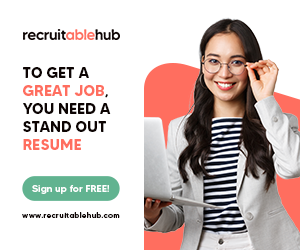With so many recent exciting technology advancements, many job seekers are turning to AI-powered writing tools like ChatGPT and Quillbot to craft their resumes, cover letters, and responses to selection criteria, with the aim of standing out in a competitive job market and getting a foot in the door. While statistic show that AI-enhanced resumes have increased the chances of getting hired, recruiters are noticing a significant issue: an overreliance on AI often leads to applications that lack a personal touch and fail to accurately showcase the candidate’s individual personality and unique abilities.
This opinion is shared by the RecruitableHub founders, Kate Bartlett and Meg Salter. With their wealth of experience in recruitment and career coaching in various sectors, they promote a balanced approach.
Kate remarks, “AI platforms like ChatGPT are innovative and helpful in streamlining the resume writing process, but maintaining authenticity in your application is crucial. We can always tell when a resume or cover letter has been copied and pasted directly from ChatGPT, and it’s a red flag for recruiters.”
Meg stresses the importance of customisation, “Tailoring your resume and cover letter for the specific role you’re applying for is essential. Many recruiters and hiring managers are becoming frustrated with the similarity in applications for the same role due to the widespread use of ChatGPT by job hunters.”
In light of this trend, screening calls have gained unprecedented importance, with employers who source candidates from RecruitableHub’s networks and database now viewing this as a critical step. Screening calls enable recruiters to evaluate a candidate’s verbal communication skills and ensure that the applicant’s spoken capabilities match the proficiency suggested by their AI-assisted applications. This step has become vital in distinguishing genuinely qualified candidates from those who might have overly relied on AI tools.
One hiring manager recently expressed relief at spotting a grammatical error in a cover letter, as it indicated the candidate had invested their time in crafting a personal application, rather than relying solely on AI.
Kate and Meg advise job seekers to use AI as a tool to start their applications but to then infuse their resume and cover letter with their personal experiences and unique skills that reflect their true selves. This approach not only ensures consistency when advancing to the interview stage, but also helps in creating a genuine connection with potential employers and colleagues.
“AI is a great starting point for drafting job applications, as it provides structure,” says Kate. “But the real impact comes from building a personal narrative of your career to date and your future aspirations. This not only guarantees authenticity in your written application but also prepares you for a smooth transition to interview stages, where your personality and true qualities can resonate.”
As technology will continue to influence the job-seeking process, the value of personalisation and authenticity in every application remains the top priority. RecruitableHub’s resume and cover letter writing platform understands this balance, offering a blended solution that combines the efficiency of AI with the ability to express your individuality.
Check it out at www.recruitablehub.com.






 Sign in with Google
Sign in with Google
 Sign in with LinkedIn
Sign in with LinkedIn